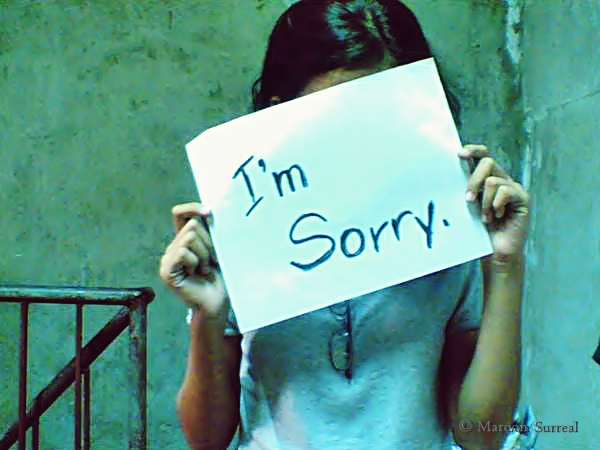
 When my children were younger and we would attend play dates, I always found myself cringing whenever a parent would make their child say they were sorry for doing something, like taking a toy or going out of turn. I have also noticed I cringe almost every time I here anyone say they are sorry for something. I always thought that hearing “I’m sorry” should make you feel better. After all, someone is apologizing for something. Yet I almost never feel better when hearing it.
When my children were younger and we would attend play dates, I always found myself cringing whenever a parent would make their child say they were sorry for doing something, like taking a toy or going out of turn. I have also noticed I cringe almost every time I here anyone say they are sorry for something. I always thought that hearing “I’m sorry” should make you feel better. After all, someone is apologizing for something. Yet I almost never feel better when hearing it.
I started researching the word “sorry” and the statement “I’m sorry I….” Interestingly enough, almost all words used in the definition of the word “sorry” are anything but words that would make you feel better. They are: distress, poor, pitiful, regret, unfortunate, tragic, sorrowful, wretched, useless and this is just a few. No wonder I never felt better when hearing “I’m sorry.” These aren’t words that convey remorse. Love, compassion, sympathy are some words that I thought I would find defining sorry. I know when I realize that some action I did could have been done differently, so as not to cause any harm, I feel love and compassion. I want to do everything I can to modify, correct, and make amends, to bring that person back to a better place.
Even more interesting is the statement “I’m sorry I….” Let’s expand on this and look at “I’m sorry I took your toy” (a very common way a parent would make a child apologize to another child). Sorry is an adjective but the only noun for it to modify is I (toy goes with the verb took). If sorry is being used to modify I, that leaves you with I am distressful, poor, pitiful, unfortunate, tragic, sorrowful, wretched, and useless. WTF? (In part 2 I will dig into this deeper).
We are all trying to teach our children manners and how to function in the world, but look at it from a child’s point of view. They took the toy. They were following a desire to have the toy, period. They aren’t sorry they took it. It is our job as parents to guide our children and that can be done by simply taking the time to explain that turns need to be taken, that you need to ask, that they need to consider other people when following desires, etc. Why don’t we do that? Why do we make them apologize when they don’t feel remorseful?
It’s the easy way. We are tired and stressed and worn out and think we don’t have the energy to teach another thing. We don’t take the time to actually address the issue, we just offer a band aid (get out of jail free card) by teaching our children that saying “I’m sorry I…” is all you need to do when you are caught in a wrong. After all, it is what we were taught, and we just keep repeating things without thinking about why we do them. We aren’t teaching manners or ways to treat each other kindly, we are teaching what to do if you get caught.
No wonder I almost never feel better when I hear those words. I feel things long before the words are spoken and when you feel that someone is truly sorry for taking your toy (causing tears and hurt), you don’t even need to hear the words… you’ll feel it. And I guarantee you that the offender will do everything in their power to never do that again. If there are no feelings, be prepared for a lifetime of hearing ”I’m sorry I…” but never feeling the compassion and love that is needed to bring about change.
Photo: “I’m Sorry” by Leyram Odacrem is licensed under CC BY 2.0




